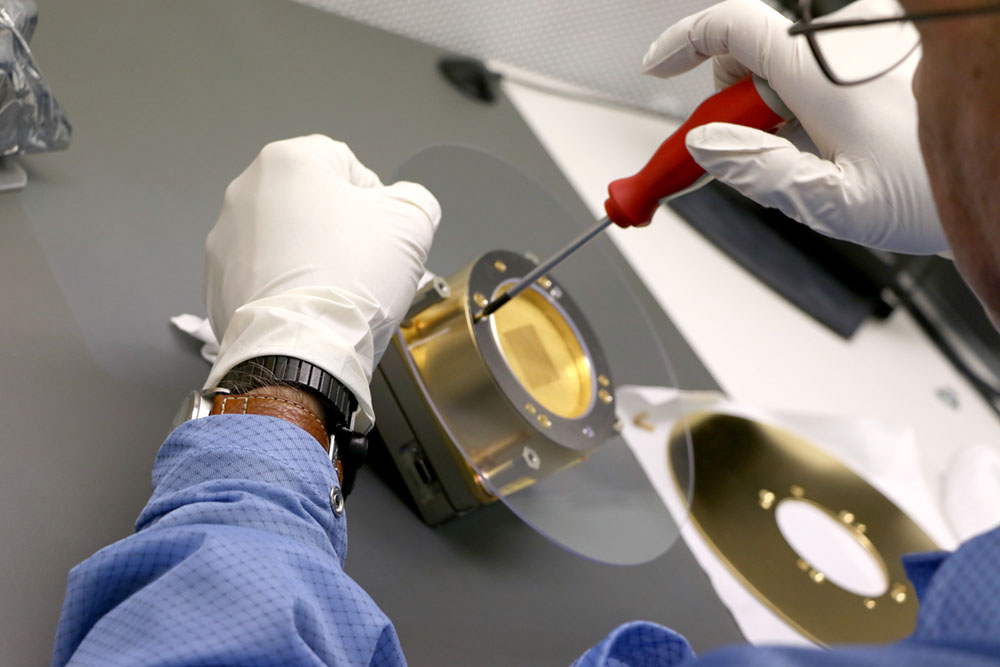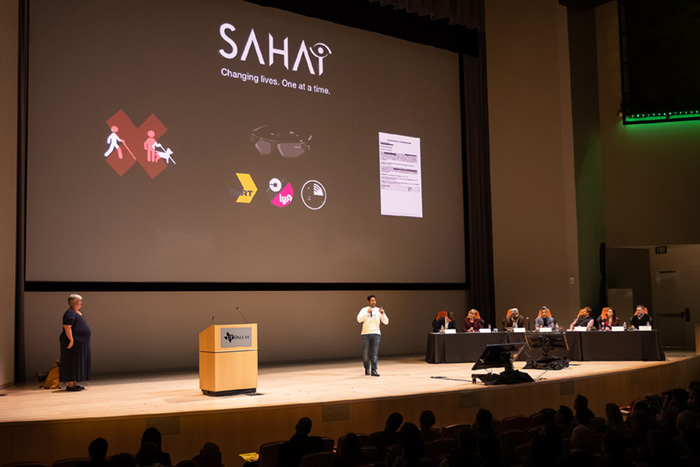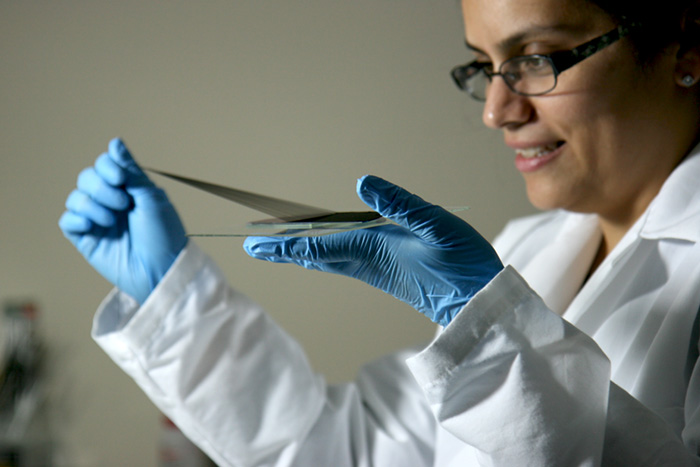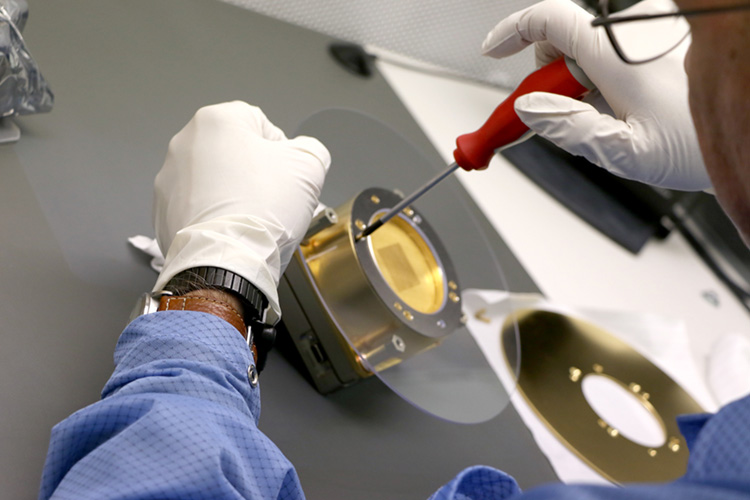
The team that supports and oversees The University of Texas at Dallas’ research activities and the transfer of discoveries to the marketplace recently changed its name to the Office of Research and Innovation.
The updated name captures the former Office of Research’s expanded role in promoting creative and innovative research and reflects how the culture of the University has embraced entrepreneurship, said Dr. Joseph Pancrazio, vice president for research.
“The term ‘innovation’ reflects how our office fosters entrepreneurship and supports the University’s mission of commercializing intellectual capital generated by our community. But innovation also describes how we think creatively as we develop new internal programs that provide vehicles for students, staff and faculty to run with their ideas,” said Pancrazio, who is also a professor of bioengineering.
The Office of Research and Innovation encompasses all the areas of a traditional university research office, including assisting faculty through the process of applying for and administering research grants and contracts; commercializing UT Dallas innovations through patents and licensing; maintaining core research facilities; and supporting campuswide health, safety and environmental practices.
In recent years, however, the office has expanded initiatives to engage faculty, staff, students and alumni in cross-disciplinary research and entrepreneurial endeavors, including establishing a startup incubator, providing seed grants to kick-start new projects and supporting competitions that showcase Comet inventiveness. In addition, the office is piloting intellectual property agreements with companies that sponsor faculty research.
“The term ‘innovation’ reflects how our office fosters entrepreneurship and supports the University’s mission of commercializing intellectual capital generated by our community. But innovation also describes how we think creatively as we develop new internal programs that provide vehicles for students, staff and faculty to run with their ideas.”
Dr. Joseph Pancrazio, vice president for research at UT Dallas
Sanaz Okhovat, associate vice president for research and chief compliance officer for the University, said the name change reflects a natural evolution of the research office.
“It’s a timely change that more directly addresses our broad influence on the University’s efforts to support and enhance research, scholarship and creative activity while continuing to support its strong commitment to community engagement.”
UT Dallas: The University of Entrepreneurship
UT Dallas’ undergraduate and graduate programs in entrepreneurship rank among the nation’s best — 18th and 10th overall, respectively — according to The Princeton Review.
“These rankings are not based just on the number of students who pass through degree programs. They have to do with an institution’s entrepreneurial culture, as a whole,” said Steve Guengerich, associate vice president for innovation and commercialization at UT Dallas.
“The universities at the top of the entrepreneurship rankings are there because their research offices are deeply engaged in technology transfer and commercialization. UT Dallas is the same — I like to say the wide range of resources from our research office goes from ‘idea to exit,’ putting UT Dallas among the very best in the nation in entrepreneurship.”

Guengerich oversees several facets of the Office of Research and Innovation, including the Institute for Innovation and Entrepreneurship (IIE), which is led by Paul Nichols, executive director. Founded in the early 2000s in partnership with the Naveen Jindal School of Management, the IIE operates across the University’s eight schools to enable the next generation’s new ventures. The institute promotes and facilitates student, faculty and alumni entrepreneurship through the Blackstone LaunchPad.
The IIE hosts the annual Big Idea Competition — a startup pitch contest for students, faculty and alumni — and facilitates the award-winning UT Dallas Seed Fund, which invests in University-affiliated technology startups.
In addition, the Venture Development Center (VDC), which opened in 2011, provides incubator space to transform early-stage startups into companies with marketable products and services. Recently the center established JetPack, a set of services that helps researchers transition from working on an idea in the lab to working on a product in an operating company. There are currently 24 companies at the VDC, which is led by senior director of technology commercialization Brent Schultze.
This spring UT Dallas announced a partnership with the city of Richardson to support the region’s startup and entrepreneur community by establishing a physical presence in the Richardson Innovation Quarter. An extension of the VDC and five new UT Dallas research centers will be in the district and will focus on solutions related to specific technological specialties.
Nurturing Innovation
Another new Office of Research and Innovation partnership, with the Office of Undergraduate Education, pairs undergraduate researchers with startup companies at the VDC. The competitive process requires students to submit their potential projects and interests to work as VDC Scholars, with corporate principals selecting the candidates to work directly with a company.
The research office and the Office of Graduate Education recently created the Master’s Accelerator Research Support (MARS) Program to connect students and faculty in ways that may lead to new projects and discoveries. Fifty-eight graduate students were selected during the inaugural program this fall to receive up to $1,000 toward research or entrepreneurial plans during their first year on campus.

In addition, in 2019, the research office established a seed grant initiative that provides internal funding to a diverse range of research and scholarly projects to provide faculty a springboard to earning larger, highly competitive grants.
“Everybody at UT Dallas has ideas,” Pancrazio said. “What we like to see is people from different academic units get together on an idea that neither of them had in the beginning such that their synergistic interactions result in something entirely new. In various ways, our office is trying to provide the accelerants to increase these interactions and increase the number of people asking, ‘What if?’ and exploring opportunities together.
“Our faculty are free to be able not just to advance research, but also to participate in becoming part of the economic engine. In addition to students, this may be our greatest product.”
